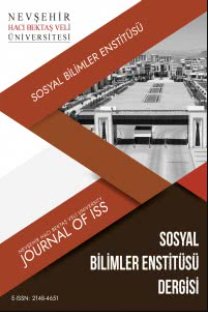BİLGİ İFŞASI (WHISTLEBLOWING) FARKINDALIĞI: GELECEĞİN MESLEK MENSUPLARI ÜZERİNE BİR ARAŞTIRMA
Bilgi İfşası, Etik, Etik Davranışlar, Muhasebe ve Finansman
AWARENESS OF WHISTLEBLOWING: A RESEARCH ON FUTURE PROFESSIONAL MEMBERS
Whistleblowing, Ethics, Ethical Behaviors, Accounting and Financial,
___
- ACFE. (2018). “Report To The Nations: Global Study on Occupational Fraud and Abuse”, 1-80.
- Akın, O., Özdaşlı, K. (2014). “Muhasebe Meslek Mensuplarının Mesleki Faaliyetlerinde Uymaları Gereken Etik İlkelere Uyma Düzeyine Yönelik Meslek Mensupları İle Meslek Yüksek Okulu Muhasebe Bölümü Öğrencilerinin Algıları”, Muhasebe ve Finansman Dergisi, Temmuz, 2014.
- Aktan, C.C. (2006). “Organizasyonlarda Yanlış Uygulamalara Karşı Bir Sivil Erdem, Ahlaki Tepki ve Vicdani Red Davranışı: Whistleblowing”, Mercek Dergisi, Ekim, 2006.
- Alkan, G.İ. (2015). “Muhasebe Eğitiminde Etik: Ön Lisans Öğrencilerinin Etik Algılarına Yönelik Bir Araştırma”, İşletme ve Ekonomi Araştırmaları Dergisi, Cilt 6 Sayı 2.
- Alleyne, P., Weekes-Marshall, D., Arthur, R. 2012. “Exploring Factors Influencing Whistle-blowing Intentions among Accountants in Barbados”, Journal of Eastern Caribbean Studies, Vol.38, 1-2.
- Bayraktaroğlu, S., Özen Kutanis, R., Özdemir, Y. (2005). “Etik Eğitiminde Neredeyiz?: İktisadi ve İdari Bilimler Fakülteleri Örneği, İkinci Siyasette ve Yönetimde Etik Sempozyumu, 18-19 Kasım.
- Bozkurt, N. (2016). “İşletmelerin Kara Deliği Hile”, Alfa Basım Yayın Dağıtım, Ekim 2016, İstanbul
- Candan, H., Kaya, T. (2015). “İhbarcılık ve Algılanan Örgütsel Destek Arasındaki İlişkinin İncelenmesine Yönelik Bir Kamu Kurumunda Araştırma”, Kahramanmaraş Sütçü İmam Üniversitesi İktisadi ve İdari Bilimler Fakültesi Dergisi, Cilt 5, Sayı 2.
- Celep, C., Konaklı, T. (2012). “Bilgi Uçurma: Eğitim Örgütlerinde Etik ve Kural Dışı Uygulamalara Yönelik Bir Tepki”, Uluslararası Eğitim Araştırmaları Dergisi, Cilt 3, Sayı 4.
- Daştan, A., Bellikli, U., Bayraktar, Y. (2015). “Muhasebe Eğitiminde Etik İkilem ve Etik Karar Alma Konularına Yönelik KTÜ-İİBF Öğrencileri Üzerine Bir Araştırma”, Bolu Abant İzzet Baysal Üniversitesi İİBF Ekonomik ve Sosyal Araştırmalar Dergisi, Bahar 2015.
- Eweie, G. ve Brunton, M. (2009) “Ethical Perceptions of Business Students in a New Zealand University: Do Gender, Age and Work Experience Matter?”, Journal of Business Ethics, 19, 1(2009).
- Gülmez, C., Kıllı, M., Öz, B. (2016). “Üniversite Öğrencilerinin Muhasebe Meslek Etiğine Bakış Açılarının İncelenmesi OKÜ Öğrencileri Örneği”, Journal of Accouiting, Finance and Auditing Studies, Vol 2, Issue 3.
- Hooks, K.L., Kaplan, S.E. and Schultz Jnr, J.J. (1994). ‘Enhancing Communication to Assist in Fraud Prevention and Detection’. Auditing: A Journal of Practice and Theory, 13.
- King III, G. (1997). “The Implications of an Organization's Structure on Whistleblowing”, Journal of Business Ethics, Vol 20, Issue 4.
- Kozak, M.A., Şahin, S. (2018). “Bilgi İfşası (Whistleblowing) ve Etik İkilem Üzerine Çıkarımlar”, Anatolia: Turizm Araştırmaları Dergisi, Cilt 29, Sayı 1.
- Kurnaz, N., Ercan, C., Kestane, A. (2018). “Muhasebe Bilgi Kalitesi Ekseninde İç Denetim Ve Bilgi İfşası (Whistleblowing) İlişkisi”, Kastamonu Üniversitesi İİBF Dergisi, 20/1.
- Label, W.A. ve Miethe, T.D. (1999). “Whistleblowing And External Auditors”. The Journal of Applied Business Research, Vol. 15., No.2.
- Lau, T.C., Choe, K. L. ve Ramly, Z. (2009). “Ethical Orientation Of Future Business Leaders: An Exploratory Research” International Review of Business Research Papers. 5; 1.
- Mesmer-Magnus, J.R. ve Viswesvaran, C. (2005). “Whistle-blowing in Organisations: An Examination of Correlates of Whistle-blowing Intentions, Actions and Retaliation”. Journal of Business Ethics, 62 (3): 277–297.
- Miceli, M. P. ve Near. J. P. (1992). “Blowing the Whistle: The Organisational and Legal Implications for Companies and their Employees”. New York: Lexington Books.
- Miceli, M. P., Rehg, M., Near, J. P., & Ryan, K. C. (1999). “Can laws protect whistle-blowers? results of a naturally occurring field experiment”. Work and Occupations, 26(1), 129–151.
- Miceli, M.P, Near, J.P ve Dworkin, T.M. (2009). “A Word to the Wise: How Managers and Policy-Makers can Encourage Employees to Report Wrongdoing”. Journal of Business Ethics 86. Miller, D. L., and S. Thomas. (2005). “The impact of relative position and relational closeness on the reporting of unethical acts”. Journal of Business Ethics, 61 (4).
- Mustapha, M., Siaw, L.S. (2012). “Will Final Year Accountancy Students Whistle Blow? A Malaysian Case”, International Journal of Trade, Economics and Finance, Vol.3, No:5.
- Near, J.P, Miceli, M.P. (1995). “Effective Whistle- Blowing”, Academy of Management Review, Vol 20, No 3.
- Near, J.P., Miceli, M.P. (1985). “Organizational Dissidence: The Case of Whistle-Blowing”, Journal of Business Ethics, 4.
- O’Leary, R. (2014). The ethics of dissent: Managing guerrilla government (2nd ed.). Thousand Oaks, CA: CQ Press.
- Park, H., Rehg, M. T., Lee, D. (2005). “The Influence of Confucian Ethics and Collectivism on Whistleblowing Intentions: A Study of South Korean Public Employees”, Journal of Business Ethics, 58. 387–403
- Pope, K. R., Lee, C. (2013). “Could the Dodd Frank Wall Street Reform and Consumer Protection Act of 2010 be helpful in reforming corporate America? An investigation on financial bounties and whistle-blowing behaviors in the private sector”, Journal of Business Ethics 112 (4): 597–607.
- Xu, Y., Ziegenfuss, D. (2008). “Reward Systems, Moral Reasoning, and Internal Auditors’ Reporting Wrongdoing”, Journal of Business and Psychology 22 (4): 323–331.
- Yayın Aralığı: 4
- Başlangıç: 2011
- Yayıncı: Nevşehir Hacı Bektaş Veli Üniversitesi
OKUL ÖNCESİ EĞİTİMİN EŞİTSİZLİKLERİ AZALTMADAKİ ROLÜ ve TÜRKİYE’DE GELİŞİMİ
Mahmut ÖZER, Cem GENÇOĞLU, Eren SUNA
DÖRDÜNCÜ SINIF ÖĞRENCİSİNİN OKUMA VE ANLAMA SORUNLARI ÜZERİNE BİR EYLEM ARAŞTIRMASI
Pınar ESENER, Mustafa TAHİROĞLU, Murat TEMUR
BİLGİ İFŞASI (WHISTLEBLOWING) FARKINDALIĞI: GELECEĞİN MESLEK MENSUPLARI ÜZERİNE BİR ARAŞTIRMA
Murat ERDOGAN, Eda ORUÇ ERDOĞAN
KARLILIĞI ETKİLEYEN İÇSEL FAKTÖRLER: KÜRESEL HAVACILIK ENDÜSTRİSİNDEN KANITLAR
